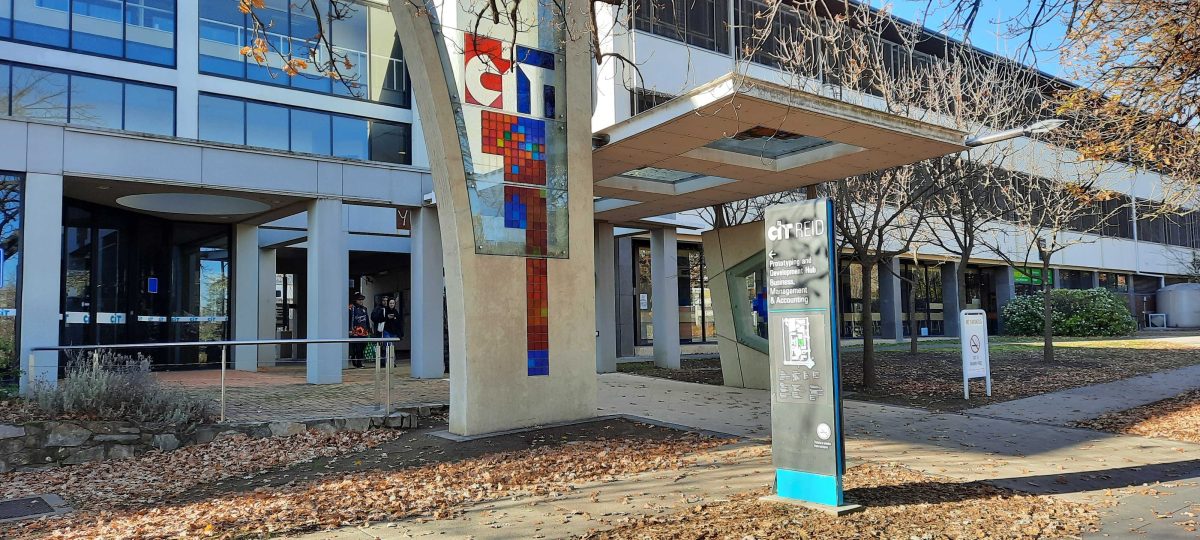
CIT Reid. After some very rough years, it is time for a better deal for CIT. Photo: Ian Bushnell
Despite controversy and criticism over the past few years, the front line of Canberra Institute of Technology (CIT) has continued to show up at work and do what they love – teach and support students and employers.
CIT continues to be awarded ACT Large Training Provider of the Year and has been allocated the National Centre of Excellence for Electronic Vehicles, which is an amazing achievement for the smallest TAFE in the nation.
But after some very rough years, it is time for a better deal for CIT.
As we approach the ACT election, CIT deserves attention, and so far, only Labor, the Greens and some independents have committed to a better deal for CIT.
The Australian Education Union (AEU) continues the ‘Rebuild with TAFE’ campaign to build the workforce and address skills shortages.
Additionally, there is agreement to Rebuild TAFE as the current Australian Government’s reform agenda prioritises rebuilding TAFE infrastructure, workforce, education foundations and student support.
Fee-free TAFE is just one positive sign of the tide turning for TAFE, but recovery is slow after years of marketisation and damage.
Prior to the election, the ACT AEU Branch circulated pledge statements for candidates to consider. The pledge statements relating to CIT include the following key factors:
- Support CIT as the public provider. A commitment of at least 75 per cent of total vocational education funding from the ACT Government is required. As a public provider, CIT provides vocational education, which is the starting point and career extension for many citizens. CIT must be fully supported to fulfil this essential role. Through the National Skills Agreement and the continuation of Fee Free TAFE, an ACT Government must show its full commitment to CIT.
- Pay parity for CIT Educators. A TAFE Teacher is dual qualified and highly experienced, both as an Educator and in their own industry.
- Current pay and workload concerns are stopping experienced people from transitioning to Educator roles perpetuating shortages in the TAFE Educator workforce. Pay parity with our industries and other Educators must be achieved in the next Enterprise Agreement.
- CIT students will be supported to thrive. As our community grapples with cost-of-living challenges, many citizens seek vocational education as the pathway to employment and a more stable life. Increasingly, TAFE students experience issues of disadvantage, both in life and as learners.
So, what does this mean for the future ACT Government and community?
To support our citizens to successfully complete a qualification, a future ACT Government needs to better support CIT and the ACT community in language, literacy, numeracy, digital skills and IT equipment.
Many students struggle to study using a device intended for basic communication (their phone), not complex study. A boost to programs for foundation and digital skills is needed, including greater access to low-cost IT and support.
Increase support for student placements as most vocational qualifications include a placement for essential learning and assessment in a workplace. Student placements are unpaid and incur costs. Most students struggle with transport, childcare, clothing and equipment and cannot afford to give up their casual jobs for a few weeks while they do a placement.
Imagine a one-adult household with children attending a local school. The adult’s placement shifts at residential aged care are 7 am to 3:30 pm, Monday to Friday. How will they manage the before and after school times? Even if local services are available, the cost will be problematic. If they rely on public transport, the challenge is greater.
Imagine a young person who relies on Food Bank, usually three days’ worth of food each visit. While attending their placement they can’t get to the Food Bank, it will be closed by the time the placement shifts end. How will this young person get enough food to get through the week of full-time placement?
Lobbying has drawn national attention to ‘Placement Poverty’ and support for students in fields of nursing, teaching and social work will be available, but this is barely the start. Vocational students also struggle. Financial, life and location barriers prevent the completion of qualifications, getting a job and becoming part of the nation’s essential workforce.
Partnerships with TAFE are essential for our economies and industries to grow and for our citizens to flourish. The partnership between the ACT Government and CIT must demonstrate the strong commitment to public education as CIT is the heart of TAFE in the ACT.
Karen Noble is the TAFE Vice President, ACT Branch of the AEU. With over 35 years as an educator and coordinator, Karen has worked for both TAFE NSW and CIT.





















